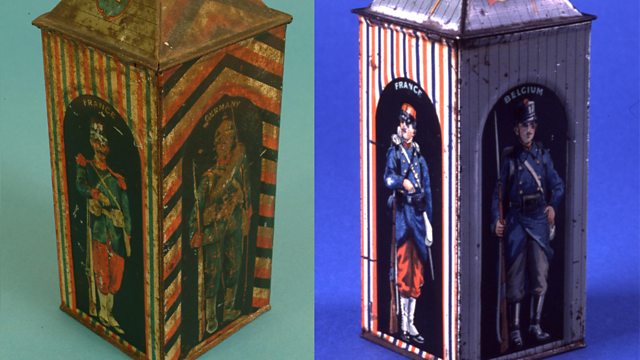Reading, Berkshire: Was the Steel Helmet Prototype Developed Here?
Did these biscuit tin makers develop the prototype for the steel helmet?
Huntley, Boorne and Stevens, famous for producing the elaborate biscuit tins for sister company Huntley & Palmers, struggled to stay in business during World War One, despite producing 19 million articles for the war effort. As biscuit tin production dried up, the factory in Reading turned to making ration tins for army biscuits, chocolates and cigarettes as well as boxes for fuses and surgical supplies. Other specialist items included smoke canisters, water bottles and stampings for use in the early manufacture of aircraft.
Controversially, despite being a Quaker company, it’s also reported to have produced more than six million detonators.
The biggest mystery surrounding the company concerns newspaper reports and accounts from the time which state Huntley, Boorne and Stevens played a key role in the development of the prototype for the steel helmet. Manufacturing, however, was clearly carried out elsewhere.
As men were called up to fight, women worked increasingly in their place, even taking on heavier jobs such as soldering. By 1916, 200,000 tin boxes were produced each week by women.
The struggling company was bought and amalgamated into Huntley & Palmers early in 1918.
Location: Huntley, Boorne & Stevens, Southampton Street, Reading, Berkshire RG1 2QL
Image: Sentry tins, courtesy of Reading Museum (Reading Borough Council)
Presented by Βι¶ΉΤΌΕΔ reporter, Janice Hunter
Duration:
This clip is from
Featured in...
![]()
Βι¶ΉΤΌΕΔ Radio Berkshire—World War One At Βι¶ΉΤΌΕΔ
Places in Berkshire that tell a story of World War One
More clips from World War One At Βι¶ΉΤΌΕΔ
-
![]()
The loss of HMY Iolaire
Duration: 18:52
-
![]()
Scotland, Slamannan and the Argylls
Duration: 07:55
-
![]()
Scotland Museum of Edinburgh mourning dress
Duration: 06:17
-
![]()
Scotland Montrose 'GI Brides'
Duration: 06:41







